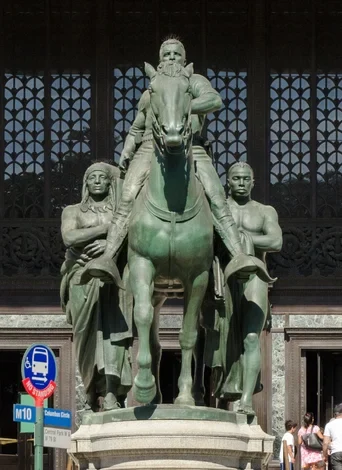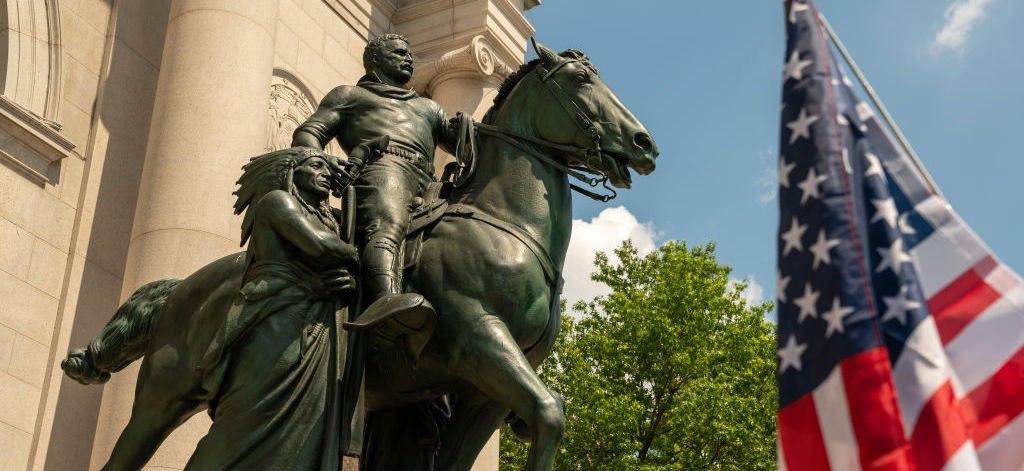A bronze statue of Theodore Roosevelt on horseback, flanked by a Native American man and a man of African descent, has for 40 years greeted visitors to the American Museum of Natural History in New York. After several years of consideration, the museum recently announced a decision to relocate the statue. In a poll conducted shortly after this decision was announced, YouGov asked 1,000 American adults whether they support relocating the statue.
Embedded in our questionnaire was a simple experiment. Survey takers were randomly assigned to one of five groups. Each group was shown a photo of the statue (pictured left) along with the following brief description: “There has been debate over whether a statue of Theodore Roosevelt should be removed from the American Museum of Natural History and relocated to another location.”

One group was then shown an argument for why the statue should be removed: “People who support the statue's removal have argued that it glorifies racism and colonialism.” A second group was shown an argument for why the statue should remain: “People who oppose the statue's removal have argued that the statue is an important reminder of Roosevelt's great legacy.” A third group was shown both the anti- and pro-statue arguments, in that order. A fourth was presented both arguments, in the opposite order. A fifth group was shown no arguments in favor or against the statue.
After reading the introductory statements, survey takers were asked, “Do you support or oppose relocating the statue?” Overall, we found that opinions do not vary significantly based on whether someone was shown statements for or against the statue.
Seven in 10 Americans oppose removing the statue, including 37% who strongly oppose removal and 32% who somewhat oppose it. Three in 10 support removing it, including 20% who somewhat support removal and 11% who strongly support it.
However, opinions on the statue do vary across demographic groups, with Black Americans being more likely to support removing it (59%) than white Americans (23%). Democrats are five times more likely to support its removal than Republicans. Younger Americans also are more inclined to say it should be removed than older Americans.
To test how opinions of Roosevelt stack up to views of other historical figures, we also asked whether there should or should not be statues or memorials in public places for Roosevelt and six other presidents: George Washington, Thomas Jefferson, Andrew Jackson, Abraham Lincoln, Woodrow Wilson, and Richard Nixon.
Democrats are more likely than Republicans to say that each of the seven presidents polled should not have public statues and memorials dedicated to them. The president whom Americans are most likely to oppose being memorialized is Nixon, a Republican who was president from 1969 until his resignation in 1974; 59% of Democrats and 37% of Republicans are opposed. The largest partisan gap is in regard to views on statues or memorials dedicated to Jackson, who was president from 1829 to 1837; four in 10 Democrats are opposed compared to only two in 10 Republicans. Less than one-quarter of members of each party oppose statues dedicated to the other five presidents polled: Washington, Jefferson, Lincoln, Roosevelt, and Wilson.
– Carl Bialik and Ian Davis contributed to this article
Methodology: This U.S. News survey was conducted by YouGov using a nationally representative sample of 1,000 U.S. adult citizens interviewed online on January 20 - 23, 2022. This sample was weighted according to gender, age, race, and education based on the 2018 American Community Survey, conducted by the U.S. Census Bureau, as well as 2016 and 2020 Presidential votes (or non-votes). Respondents were selected from YouGov’s opt-in panel to be representative of all U.S. citizens.
Image: Getty











